Introduction
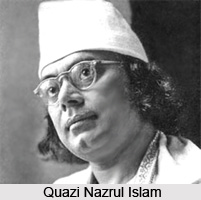 Kazi Nazrul Islam also known as Quazi Nazrul Islam was the totem for revolution through his poetry and music had its crescendo in his able hands. Nazrul Islam was known for his fiery poems and moving songs; his greatness is incommensurate as is Tagore`s. Though many of his poems are revolutionary in nature, he had also composed poems for children and in other genres.
Kazi Nazrul Islam also known as Quazi Nazrul Islam was the totem for revolution through his poetry and music had its crescendo in his able hands. Nazrul Islam was known for his fiery poems and moving songs; his greatness is incommensurate as is Tagore`s. Though many of his poems are revolutionary in nature, he had also composed poems for children and in other genres.
After India (Partition of India) was divided in 1947, Bangladesh recognised him their National Poet. He was one of the most versatile poets that Bengal ever witnessed. The poet conquered the home and the world with songs and compositions that were the result of a particular age but he himself quoted, "Even though I was born in this country (Bengal), in this society, I don`t belong to just this country, this society. I belong to the world." The poet is alive still today. Resonances fill up the air with perpetual shouts of rebellion that he had implanted in every heart. So does the hope of seeing "One Great Union of Humanity".
Early Life of Kazi Nazrul Islam
Kazi Nazrul Islam was born on May 24, 1899 in Churulia village of Burdwan district, West Bengal. His father was an Imam of local mosque. His mother`s name was Zaheda Khatun. He had two brothers and a sister. His father passed away when he was just 9 years old and hence he took up his father`s job to support the family. He was often referred to as `Dukhu Mian` or the Sad Man. From a tender age, Nazrul visited mosques and mausoleums and learnt Quran and Islamic theology. In 1910, he joined a `leto` or travelling theatrical group which was run by his uncle. Nazrul wrote a number of folk plays for his group, which included Chasar San, Shakunibadh, Raja Yudhisthirer San, Data Karna, Akbar Badshah, Kavi Kalidas, Vidyabhutum, Rajputrer San, Buda Saliker Ghade Ron and Meghnad Badh. In 1912-13, he joined the Kabi troupe of Basudeva and then served as the cook to a railway guard and was an apprentice with a baker`s shop. In 1914, he went to Mymensingh District (Bangladesh) and got admission in Shiarsol Raj School in class VII. During his school life Nazrul studied Bengali, Sanskrit, Arabic, Persian literature and classical music. From there he escaped Lahore to join the army to the Bengali Regiment before taking the Matriculation examination.
Career of Kazi Nazrul Islam
For a man as prolific as the poet laureate Nazrul, the ebbs and tides of fame touched him but only after his intimate association with aphasia and amnesia, his never failing friends. The lore of the followers still echo with the belief of slow poisoning by the British as the cause of deterioration of the poets health. His retreat to Calcutta in 1920 marked the writing of poetry, short stories essays, novels and songs. He joined the staff of the "Bangiya Mussalman Sahitya Samiti". He also worked as a newspaper editor, a film actor, a freedom fighter and a political worker. His first collection of poems "Bodhan", "Shat-il-Arab", "Kheya-parer Tarani" and "Badal Prater Sharab" got lots of critical accolades. In October 1921, Nazrul went to Santiniketan to meet Rabindranath Tagore. Despite many differences, Nazrul looked to Tagore as a mentor and the two were pretty close to each other. He also wrote a memorable poem on Rabindranath Tagore`s death.
Kazi Nazrul Islam as a Revolutionary Poet
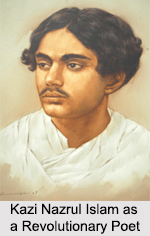 Kazi Nazrul Islam as a Revolutionary Poet emerged with numerous poems, songs, ballads, stories and essays poured from his pen in rapid succession. He was a symbol of revolution and hope against fascism and oppression. His poetry and revolutionary songs and nationalist activism earned him the title of "Bidrohi Kobi" (Rebel Poet). In 1921, Kazi Nazrul Islam published his seminal poem titled "Bidrohi" (The Rebel). The poem immediately established his identity as a countercultural maestro of impassioned verses. His revolutionary songs played an important role during the Liberation War.
Kazi Nazrul Islam as a Revolutionary Poet emerged with numerous poems, songs, ballads, stories and essays poured from his pen in rapid succession. He was a symbol of revolution and hope against fascism and oppression. His poetry and revolutionary songs and nationalist activism earned him the title of "Bidrohi Kobi" (Rebel Poet). In 1921, Kazi Nazrul Islam published his seminal poem titled "Bidrohi" (The Rebel). The poem immediately established his identity as a countercultural maestro of impassioned verses. His revolutionary songs played an important role during the Liberation War.
Kazi Nazrul Islam is a secular icon for his works for mass people regardless of their religious beliefs, socio-economical position, and gender. He expressed his beliefs of harmony through poems and songs. Yet, his poems and songs on love remained just as tender, melodic and heartbreaking.
Contributions of Kazi Nazrul Islam as a Revolutionary Poet
Kazi Nazrul Islam"s first contribution was "Baadhan Hara" (Unrestrained), a novel in the form of letters. Among his contributions in the first year were some outstanding poems like "Shatil Arab", an ode to the river of that name, "Moharram", "Korbani", "Fatiha Doazdaham", "Badal Prater Sharab" (Wine for a Rainy Morning), an allegory entitled "Badal Barishane" (While it Rained) and other poems and songs. A poem entitled "Kheya Parer Tarani` (Ferry Boat) is a wonderful combination of sublimity with resonant rhyme. Kazi Nazrul Islam is known to have received inspiration for writing this poem from a painting of a boat by a lady of a distinguished family of Dhaka, Bangladesh.
Kazi Nazrul Islam took to Political Journalism. He had left school and joined the army also with the political motive of service to his country. In 1920, he made his first debut in Political Journalism. It was a period of intense stress and tension. The people"s anger at the Jallianwala Bagh Massacre and other violence in the Punjab in 1919 led to the launching of the Non-Cooperation Movement under the leadership of Mahatma Gandhi. Kazi Nazrul Islam joined the Bengali evening daily "Nabayug" (The New Era) founded by the well-known leader A.K. Fazlul Huq. "Upasana" and "Saogat" are the other monthlies for which Nazrul wrote at the time. While working for "Nabayug" and though busy writing political editorials, Nazrul produced many remarkable poems. His writings at the time were later collected in a book entitled "Yugabani" (Message of the Age); but the book was immediately banned by the Government.
The Non-Cooperation Movement was on and Kazi Nazrul Islam celebrated the epochal arrival of Mahatma Gandhi. Nazrul wrote a Satya Mantra (the Mantra of Truth):
"Let the injunctions in your books be burnt down; Let God"s injunctions prevail"
Kazi Nazrul Islam also wrote many lyric pieces inspired by sentiment for those dear and near to him. "Banglar Katha", Nazrul wrote for the paper, a remarkable poem which could also be sung. It is entitled “Bhangar Gaan†(the Song of Destruction).
The crowning moment of his poetic career had come in 1921, when Kazi Nazrul Islam wrote the long and virile poem "Bidrohi" (the Rebel) which at once established him as a major poet. The poem caused an unprecedented sensation but also an adverse reaction among some of his literary contemporaries. Rabindranath Tagore and Sarat Chandra Chatterjee welcomed the new poet into the literary firmament of Bengal.
In 1922 while writing for "Sevak" Kazi Nazrul Islam planned and published a political weekly called "Dhumketu" (The Comet). The paper`s revolutionary fervour made a great impact on the educated middle class. Dhumketu was thus a hallmark of Kazi Nazrul Islam`s politico-literary career. It stood openly for complete independence from British rule and soon got into trouble with the Government. In 1923, Nazrul was arrested for a poem named "Anandamayeer Agamane" (on the advent of the Goddess of Happiness) that was published in one of the issues of the paper. He was tried and sentenced to one year`s rigorous imprisonment. While in jail Kazi Nazrul Islam composed a number of romantic poems, most outstanding among which was "Pujarini" (The Woman Worshipper). After his release from jail Nazrul, plunged into politics again and collaborated in founding Labour Swaraj Party of the Indian National Congress. He became the director of a new weekly called "Langal" (The Plough). He composed and published in Langal, a compact series of poems called "Samyabadi" (Song of Equality).
Kazi Nazrul Islam went to Krishnanagar, where a number of conferences were held at Krishnanagar at that time and in each of them Nazrul sang songs, composed by him, suitable for the occasion. It was at that conference he sang "Kandari Hushiar" (Helmsman, Beware) which has since taken its place in Bengal as a chorus song of unparalleled fervour. He composed 2 novels at Krishnagar, "Kuhelika" (Fog) and "Mrityu-Kshudha" (Hunger for Death).
In 1926, communal riots had broken out in Calcutta (now Kolkata) and Kazi Nazrul Islam reacted strongly in a number of articles published in "Ganabani". The poems were later collected in the book "Phani-Manasha" (Thorny Cactus) and the articles were later collected and published in a book called "Rudra Mangal" (To the Terrible God).
A public reception was accorded to Kazi Nazrul Islam in Calcutta in the middle of 1929. Acharya Prafulla Chandra Ray, the eminent scientist and Subhas Chandra Bose paid a remarkable tribute to Kazi Nazrul Islam and his soul-stirring poems and songs.
Personal Life of Kazi Nazrul Islam
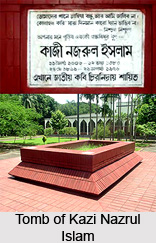 In 1921 he was engaged to have marriage with Nargis, the daughter of a well known Bangladeshi publisher Ali Akbar Khan. On 18th June 1921, Nazrul walked away from the marriage ceremony. Later he married Pramila on 25 April 1924. Pramila belonged to the Brahmo Samaj, which criticised her marriage to a Muslim. His personal life was fraught with depressing realities and venomous pangs of pain. Losing both his sons to then-incurable illnesses, the dejected father sought shelter in music and poetry. He combined devotional music from Hinduism and Islam gave rise to a beautiful amalgam. Himself born a Muslim, Nazrul never believed in religious fanaticism. His works bear undying testimony to his absolutely secular loyalties, and he never left a stone unturned in his yet-unachieved goal of harmony between the two religions.
In 1921 he was engaged to have marriage with Nargis, the daughter of a well known Bangladeshi publisher Ali Akbar Khan. On 18th June 1921, Nazrul walked away from the marriage ceremony. Later he married Pramila on 25 April 1924. Pramila belonged to the Brahmo Samaj, which criticised her marriage to a Muslim. His personal life was fraught with depressing realities and venomous pangs of pain. Losing both his sons to then-incurable illnesses, the dejected father sought shelter in music and poetry. He combined devotional music from Hinduism and Islam gave rise to a beautiful amalgam. Himself born a Muslim, Nazrul never believed in religious fanaticism. His works bear undying testimony to his absolutely secular loyalties, and he never left a stone unturned in his yet-unachieved goal of harmony between the two religions.
After a sudden attack of paralysis on July 10, 1942, he was completely bedridden. He breathed his last on August 29, 1976 at the age of 77. When a flame burns progressively lighting a soul and the unquenched thirst for the right pulsates in a heart, poetry dons a fierce mantle. Nazrul continues to burn bright amidst the darkness of the night of human civilization like a tempest that traversed the heaven and earth and the world beyond.
Works of Kazi Nazrul Islam
His first anthology of poems was "Agniveena" in 1922, which got outstanding success. In this year his famous poem collection `Bidrohi` was published. He also published his first volume of short stories, the "Byather Dan" and "Yugbani", an anthology of essays in this year.
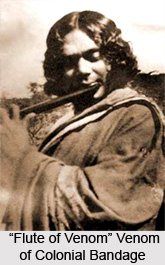
He received the title of `Bidrohi Kabi` for his revolutionary writings. Fire oozed through his writings as he penned down: "I am the eternal rebel/ I raise my head beyond the world/ High ever erect and alone". 1922 witnessed the Rebel Poet`s publication of `Bidrohi` which manufactured a fierce insurmountable spree of hard-nosed nationalism in the hearts of the young Indians, and bred abysmal fear in the minds of the British. Kazi Nazrul Islam and the sobriquet that he is best known by today, is a remnant of that very cult that the poet had given birth to with his poem `Bidrohi`. Till date, it is lauded as his most famous work, and till date he remains best known as Bidrohi Kobi (The Rebel Poet). Nazrul started a bi-weekly magazine, "Dhumketu" on August 12, 1922 where he used to write revolutionary poems, articles etc. His passionate activism in the Indian independence movement through those writings often led to his imprisonment several times by British government. While in prison, Nazrul wrote the "Rajbandir Jabanbandi" and condemned Islamic fundamentalism, orthodox traditions and bigotry in society. Upholding the life and abysmal conditions of the downtrodden masses of India, Nazrul advocated for their emancipation.
An epitome of a rebel with a cause who nursed a binary hatred for oppression and fascism, a spiritual visionary who hardly down in front of his detractors, an idealist Nazrul was a man who was the genius incarnate who emblazoned the consciousness of the unconscious mind. Nazrul`s visionary philosophy, a deep-seated love for equality of men and women makes him one of the first vocal feminists that the country has ever known. As he writes:" I don`t see any difference/Between a man and woman/Whatever great or benevolent achievements/That are in this world/Half of that was by woman,/The other half by man." At a time when women were thought to have been born either to aid men in their way or to spend all their lives trying to rise to the expectations of men!
He wrote over 2600 songs. To bring variations in his songs not only he used 200 ragas of classical music but also adapted different forms like- Dhrupad, Khayal, Tappa, Thumri, Dadra, Kajri, Chaiti, Rasia, Ghazal, Kirtan, Baul, Jhumur, Santhali Folksongs, Jhanpan Or The Folk Songs Of Snake Charmers, Bhatiali, Bhaoaia And Even Western Music. He retrieved some lost ragas and created few ragas and talas. His songs on communal harmony, socialistic inspiration and economic freedom are worth a special mention. Despite being a Muslim by birth, he composed several devotional songs like Bhajans, Shyamasangeets, Agamanis, Kirtans and also a large number of religious songs on invocation to Lord Shiva, Goddess Lakshmi and Goddess Swaraswati and on the theme of love of Radha and Krishna. Nazrul`s emancipated thoughts made him what he is. His works have been banned innumerable times only to forecast the fact that he was much, much ahead of his times.
Ghazals of Nazrul Islam
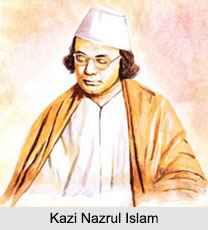 Kazi Nazrul Islam composed almost 4000 songs, which are known as Nazrul Geeti or the songs of Nazrul. These songs, equally popular in India and Bangladesh, have also been translated into Oriya language. The songs have been composed in four musical styles- Revolutionary Mass Music, Bhakti Geeti, Ghazals and Ragasrayi Songs. Bengali Ghazals were the innovation of Nazrul Islam, which was the grand introduction of Islam to the traditional Bengali Music. The Ghazals were moulded into the form of Persian Ghazal based on the theme of love and nature. Kazi Nazrul Islam profusely enriched Ghazals in Bengali language.
Kazi Nazrul Islam composed almost 4000 songs, which are known as Nazrul Geeti or the songs of Nazrul. These songs, equally popular in India and Bangladesh, have also been translated into Oriya language. The songs have been composed in four musical styles- Revolutionary Mass Music, Bhakti Geeti, Ghazals and Ragasrayi Songs. Bengali Ghazals were the innovation of Nazrul Islam, which was the grand introduction of Islam to the traditional Bengali Music. The Ghazals were moulded into the form of Persian Ghazal based on the theme of love and nature. Kazi Nazrul Islam profusely enriched Ghazals in Bengali language.
Examples of Nazrul Geeti Ghazals
Some of the Nazrul Geeti Ghazals are:
"Gagane Pabane": Here the poet is talking about the nature. The word "Gagan" means sky and "Paban" means air.
"Patha Chalite Jodi Chakite": This song is purely based on the theme of love. Here the poet is addressing his beloved.
"Pashaner Bhangale Ghum": The word "Pashan" means relentless. Here an unmerciful person is awakened from sleep. So the poet is asking why he has been awakened.
"Dite Ele Phul He Priya": Here the poet"s beloved has come to give him flowers upon which he asks her why she has brought flowers.
Some other popular Ghazal Nazrul Geeti songs are:
•"Tomarei Ami"
•"Sedin Nishithe"
•"Paradeshi Priyotomo"
•"Bokul Champar Bone Ke More"
•"Musaafir Mocch Re Ankhi Jal"
•"E Ki Sure Tumi Gaan"
•"Gulbagichar Bulbuli"
•"Harano Hiyar Nikunjo Pathe"
Achievements of Kazi Nazrul Islam
His biggest contribution was that he increased the horizon of Bengali literature. Nazrul was awarded the Jagattarini Gold Medal in 1945 - the highest honour for work in Bengali literature by the University of Calcutta. He was awarded the Padma Bhushan in 1960. He received Ekushey Padak by the Government of Bangladesh and was given the Honorary D.Litt. by the University of Dhaka.
Literary Concepts of Kazi Nazrul Islam
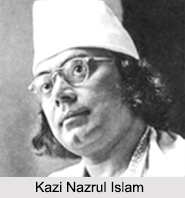 Literary Concepts of Kazi Nazrul Islam has inspired many activists and revolutionists from his large collection of poetry and music with themes, such as religion, spiritualism and humanity. For his tremendous contribution towards the field of music, literature and art; Kazi Nazrul Islam was honoured by the Government of India with the prestigious "Padma Bhushan Award" in 1960.
Literary Concepts of Kazi Nazrul Islam has inspired many activists and revolutionists from his large collection of poetry and music with themes, such as religion, spiritualism and humanity. For his tremendous contribution towards the field of music, literature and art; Kazi Nazrul Islam was honoured by the Government of India with the prestigious "Padma Bhushan Award" in 1960.
Poems of Kazi Nazrul Islam
Kazi Nazrul Islam wrote many of his most meaningful poems while he was busy in journalistic work. He wrote poetry and song as he felt the urge to write and had to be taken only for what he was. The young generation was particularly enchanted by him. Alliteration and other methods of musical effect figured prominently in his poems. Particular mention needs to be made of his poems for children which appeal directly to children"s imagination and have become very popular with them. Many of these poems have the effect of moving the child"s imagination to greatness. Kazi Nazrul Islam may thus be regarded as having commanded complete freedom of the realm of poetry and song.
Short Stories and Novels of Kazi Nazrul Islam
The short stories and novels of Kazi Nazrul Islam present particularly of love and similar passions; but they are more of the nature of an account of human experience than a logical treatment of complicated ups and downs in human relationship. Revolutionary idealism and love overwhelmed by social disparity lend political overtones to some of his stories and novels. As an essayist, Kazi Nazrul Islam"s speciality has been his passionate reaction, in vibrant style and language to current problems.
Publications of Kazi Nazrul Islam
Contemporary writers have noticed; the tremendous enthusiasm with which Kazi Nazrul Islam"s political writings used to be received especially his articles in "Dhumketu". Every week, on the day of publication of the paper, hundreds of people waited at street corners for the hawkers to come and there was a scramble for copies. The British Government not only banned them but saw to it that they were destroyed. Only a few saved in private collections have survived. His articles state that youths must give the first place to the fight for life and not be inhibited by religious injunctions. Other articles give clarion calls for sacrifice of life, for pledging everything, including life, to the destruction of evil. The style and vigour of his language worked sharply upon the people"s minds. For young men and women they worked as catalysts to action.
As a litterateur, Kazi Nazrul Islam has been in a class by himself. The note of rebellion in his poetry, the passionate sweep of his creation, and his free sojourn in the realm of improvised melodies, marked him apart. He was concerned to use his natural talents to voice the joys, sorrows, loves, fears and struggles of the people with whom his kinship of heart was complete.
Bhakti Geeti of Nazrul Islam
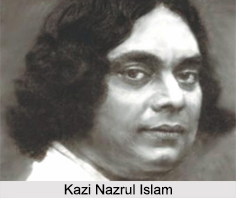 Songs written and composed by Kazi Nazrul Islam are known as Nazrul Geeti or the songs of Nazrul. Nazrul almost composed 4000 songs of different types, which are equally popular around India and Bangladesh. The songs are of different musical styles, which can be differentiated in four groups, namely Revolutionary Mass Music, Bhakti Geeti, Ghazals and Ragasrayi Songs. Bhakti Geeti songs of Nazrul are entirely based on Bhajans of Lord Krishna and Shyama Sangeet dedicated to Goddess Kali. Nazrul Islam made an enormous contribution to make the Shyama Sangeet genre rich. He was thoroughly familiar with the Bengali traditions and culture.
Songs written and composed by Kazi Nazrul Islam are known as Nazrul Geeti or the songs of Nazrul. Nazrul almost composed 4000 songs of different types, which are equally popular around India and Bangladesh. The songs are of different musical styles, which can be differentiated in four groups, namely Revolutionary Mass Music, Bhakti Geeti, Ghazals and Ragasrayi Songs. Bhakti Geeti songs of Nazrul are entirely based on Bhajans of Lord Krishna and Shyama Sangeet dedicated to Goddess Kali. Nazrul Islam made an enormous contribution to make the Shyama Sangeet genre rich. He was thoroughly familiar with the Bengali traditions and culture.
Krishna Bhajans
Krishna Bhajans of Kazi Nazrul Islam are dedicated to Lord Krishna. Some of the songs of this genre are:
"He Gobindo Rakho Chorone": Here Nazrul Islam is addressing Lord Krishna to keep him on Krishna"s feet. In this song, he prays to Krishna to always shower blessings on them.
"Gangane Krishna Megh Dole": Here the poet sees "Krishna Megh" (black clouds) on the sky and he symbolizes it as Lord Krishna in them.
"Bone Jaye Ananda Dulal": In this song Nazrul addresses Krishna as Dulal and the poet sees him
"Hariye Gache Brajer Kanai": Here Nazrul Islam addressing Krishna as Kanai says that Kanai of Brah Bhoomi is lost in forests; he cannot find Him.
Shyama Sangeet of Nazrul Islam
Shyama Sangeet are devotional songs dedicated to Goddess Kali another form of Goddess Durga. Nazrul Islam composed several Shyama Sangeet, some of which are:
"Jago Jogmaya Jago Mrinmoyee": Here the poet calls Goddess Durga by her another name Mrinmoyee to evoke her.
"Amar Kalo Meyer Payer Tolaye": "Kalo Mey" (dark complexioned girl) is addressed to Goddess Kali. The poet wants to stay underneath her feet.
"Aar Lukabi Kothaye Maa": Here the poet asks Goddess Kali now where she will hide because of not being able to find her.
"Antore Tumi Acho Chirodin": The poet prayers to the goddess and says that she is perched in his heart (Antore).
Other Popular Bhakti Geeti of Nazrul
Some other popular Bhakti Geeti songs of Nazrul Islam are:
•"Ebar Nabin Mantre Hobe"
•"Amar Kalo Mey Raag Koreche"
•"Mahabidya Adyashakti"
•"Maa Go Ami Mandomati"
•"Sajiacho Jogi"
•"Mahakaler Kole Eso"
•"Tor Bhubone Jwale Eto Alo"



















